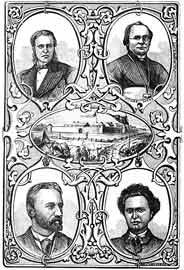Cat No.: CA0071:
The settlement of Canada by non-indigenous people proceeded in a generally westerly direction from the Atlantic to the Rockies. In any particular area it generally, started with the exploiters of the abundant natural resources (mostly hunters and trappers of the fur trade), and was closely followed by the commercial interests dealing with this trade in natural resources (such as the Hudson’s Bay Company). Following this are the pioneer settlers, and finally these settlers bring with them the higher levels of government - including the instruments of civil discipline as represented by the police and military forces.
The great forest and prairie areas to the west of “the Canadas” - Lower & Upper - were no exception to this general rule but, in the case of Manitoba the process was not as politically “smooth” as it had been in Upper Canada (now Ontario). Hidden within the settlement process (as described above) there is a transition from exploitation, largely for the benefit of external “investors” to, exploitation for the benefit of the occupying “investors,” i.e., the settlers themselves, and it was in making this transition that the “Red River Troubles” became an issue, culminating in actual - and deadly - physical conflict between the factions.
This book reviews and examines, in detail, the whole process of the exploitation and settlement of what we now call Manitoba as it went through these processes. It seems that many “local” conflicts generate a long lasting polarization of opinion. Even today, let alone over 100 years ago when this book was written, there seems to be no agreement as to who was “right” and who was “wrong” in this conflict, although there can be no doubt as to who “won” and who “lost.” It is made clear that the sympathies of the author, Alexander Begg (? - 1897) lie with the British government (as represented by the Colonial parliament) and with the owners of the Hudson’s Bay Company, the unsurprising “winners” of the conflict. This has a strong influence on how these unfortunate events are recounted, including his “demonization” of Louis Riel amongst the losing leaders, and his “praise” of the supervisory participants from the winning government side.
While the book clearly sets out to provide an account of the political and strategic situation in this conflict it also brings us a first hand account of what it was like to live through these times and what a person could expect in the nature of accommodations, victuals, and personal comforts. 408 pages of fully computer searchable text.
No. of CDs is: 1 ; Format is: PDF ; Searchable?: YES;
FastFind: Yes; ISBN No.: 978-1-897405-97-0 ;


